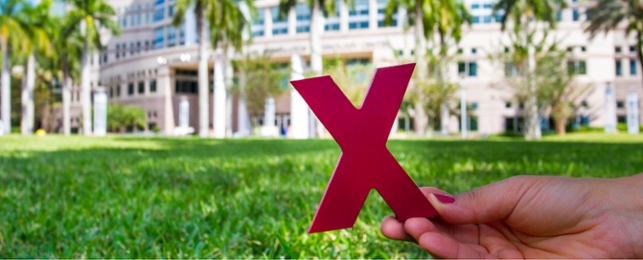
2015 TEDXNSU

TEDxNSU is an annual event, featuring engaging lectures, videos, visual art, and interactive experiences, hosted by the College of Psychology at Nova Southeastern University. TEDxNSU showcases the scholarly work of members of the university.
Thought-provoking events like TEDxNSU support the college's aim to encourage intellectual exploration and the sharing of ideas amongst students, faculty and staff, and members of the local community. TEDxNSU expands this reach to a global audience with videos of the lectures available on YouTube.
TEDxNSU 2015: Perception
Saturday, March 28, 2015
Noon–5:00 p.m.
NSU's Main Campus | Davie, Florida
Performance Theatre | Don Taft University Center
Theme
This year's theme was Perception. Everyone interprets the world in their own way, through a unique lens. Our perception impacts how we color incoming information. Our world view is constructed with satirical, scientific, religious, political, and/or personal thoughts and experiences. At this year's TEDxNSU, we invited speakers with a distinct perspective to offer up ideas that we can use to question the lens through which we view the world and perhaps change our constructions.
TEDxNSU 2015 Speakers
Sarah Bramblette
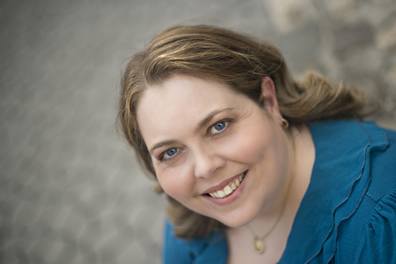 Sarah Bramblette is a student in NSU’s M.S. in Health Law program. Living with lipedema and lymphedema, she combines her experiences as a patient and a healthcare administrative professional in her advocacy efforts. Despite the daily challenges of living with a chronic medical condition, she uses her positive perspective to win allies in her fight to make the world a better place. In public forums—including on Capitol Hill—Bramblette welcomes honest discussions about her own health in an effort to advocate against weight bias. Her personal story has been shared on the nationally syndicated TV show The Doctors; in the Obesity Action Coalition’s Your Weight Matters magazine, Psychology Today, and the Narrative Inquiry in Bioethics on Obesity; and on the following websites: ObesityHelp.com, WEGOhealth.com, and HealthCentral.com. Branblette is a member of the American Health Lawyers Association, Obesity Action Coalition, National Lymphedema Network, and ObesityHelp. She was awarded the 2014 Obesity Action Coalition Member of the Year and first place in the Health Central’s Live Bold Anti-Stigma Contest.
Sarah Bramblette is a student in NSU’s M.S. in Health Law program. Living with lipedema and lymphedema, she combines her experiences as a patient and a healthcare administrative professional in her advocacy efforts. Despite the daily challenges of living with a chronic medical condition, she uses her positive perspective to win allies in her fight to make the world a better place. In public forums—including on Capitol Hill—Bramblette welcomes honest discussions about her own health in an effort to advocate against weight bias. Her personal story has been shared on the nationally syndicated TV show The Doctors; in the Obesity Action Coalition’s Your Weight Matters magazine, Psychology Today, and the Narrative Inquiry in Bioethics on Obesity; and on the following websites: ObesityHelp.com, WEGOhealth.com, and HealthCentral.com. Branblette is a member of the American Health Lawyers Association, Obesity Action Coalition, National Lymphedema Network, and ObesityHelp. She was awarded the 2014 Obesity Action Coalition Member of the Year and first place in the Health Central’s Live Bold Anti-Stigma Contest.
“Breaking Bias”
With just one look at my 430-pound body, people instantly have a negative perception about the status of my health and nature of my character. When I arrive at a job interview or doctor’s office, my fate is often sealed as soon as I’m seen. But, my excess weight is due to a medical condition called Lipedema, not poor lifestyle choices. The obesity epidemic affects one-third of American adults, yet research shows that weight bias in the healthcare industry actually hinders patients’ ability to receive quality care, which creates a cycle that leads to poorer overall health. The cost of obesity-related illness is nearly 21 percent of annual medical spending in the U.S. The rising cost of healthcare affects everyone. Therefore, everyone should play a role in breaking the bias that inhibits the efforts to reduce obesity.
Brittany Calaluca
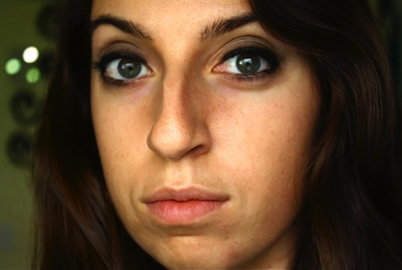 Brittany Calaluca considers herself a “life chaser.” An NSU undergraduate student majoring in exercise and sport science, she is also a coach, personal trainer, entrepreneur, creative thinker, artist, photographer, jewelry designer, and young woman making her way in the world. “Locally grown,” Calaluca loves the beach, kayaking, and outdoor fitness. In support of her passions, she owns and runs two small businesses: Rawk Sport and Fitness (a fitness coaching company) and Woodstock Peaces (a handmade jewelry company that aims to inspire young, female entrepreneurs). Last November, she spoke at NSU’s Diversity Summit, where she released her latest project, Rawk Sport Magazine, a no-Photoshop publication featuring local community members as the fitness models. Calaluca’s academic achievements include placement on the Dean’s List, membership in the Delta Epsilon Iota honor society, and her role as vice president of NSU’s Exercise Science Student Organization.
Brittany Calaluca considers herself a “life chaser.” An NSU undergraduate student majoring in exercise and sport science, she is also a coach, personal trainer, entrepreneur, creative thinker, artist, photographer, jewelry designer, and young woman making her way in the world. “Locally grown,” Calaluca loves the beach, kayaking, and outdoor fitness. In support of her passions, she owns and runs two small businesses: Rawk Sport and Fitness (a fitness coaching company) and Woodstock Peaces (a handmade jewelry company that aims to inspire young, female entrepreneurs). Last November, she spoke at NSU’s Diversity Summit, where she released her latest project, Rawk Sport Magazine, a no-Photoshop publication featuring local community members as the fitness models. Calaluca’s academic achievements include placement on the Dean’s List, membership in the Delta Epsilon Iota honor society, and her role as vice president of NSU’s Exercise Science Student Organization.
“Rising Above the Magazine Covers”
After a series of events including preparing for a bikini competition, taking a Photoshop class, and dealing with food obsessions, Brittany Calaluca realized that bodily perfection is not reality. Anything close to it is short lived and technologically created. As a fitness professional, she has adopted a personal mission to air out the industry’s dirty laundry of unhealthy diets, food and body-part obsessions, and a reliance on Photoshop to create the ideal images of a fitness model. This talk will include Calaluca’s personal experience, statistical data, and examples of the power and influence of digital photo editing. Where is the real work being done—in the gym or on a computer?
Joshua Loomis
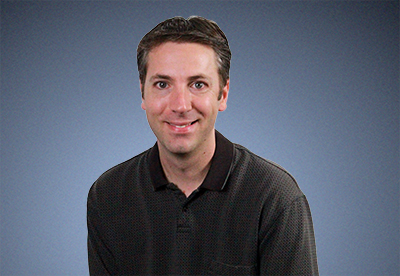
“Uncovering Truth with Faith and Reason”
Few topics have historically raised as much hostile debate as the apparent incompatibility between faith and science. As science continues to unravel the mysteries of the natural world at an unprecedented pace, many in the faith community have responded by rejecting any finding that they perceive as contradictory to what is found in their religious texts. This has unfortunately created a situation in which many feel forced to make a choice to either follow the word of God or embrace the theories and findings of science. The purpose of this talk is to dispel the myth that faith and science are contradictory and to instead show that they actually complement one another as they both seek to find truth.
Weylin Sternglanz
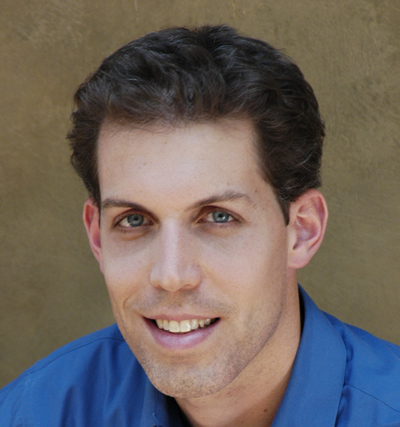 Weylin Sternglanz, Ph.D., is an associate professor at NSU’s College of Psychology. He earned his doctoral degree in social psychology at the University of Virginia (2003), where he received the Outstanding Graduate Teaching Award and the Maury Pathfinder Award for Best Thesis. His primary research interests and publications are in the areas of interpersonal perception, nonverbal decoding accuracy, deception detection, and empathic accuracy. He is particularly intrigued by how people use verbal and nonverbal cues to infer the thoughts, emotions, and intentions of other people. He has received research funding from Psi Chi, the international honor society in psychology, and was named Adviser of the Year in 2008 for his role with the honor society. Sternglanz teaches courses in social psychology, research methodology, interpersonal perception, and interpersonal communication. Just for fun, he helps run NSU’s Annual Undergraduate Film Festival.
Weylin Sternglanz, Ph.D., is an associate professor at NSU’s College of Psychology. He earned his doctoral degree in social psychology at the University of Virginia (2003), where he received the Outstanding Graduate Teaching Award and the Maury Pathfinder Award for Best Thesis. His primary research interests and publications are in the areas of interpersonal perception, nonverbal decoding accuracy, deception detection, and empathic accuracy. He is particularly intrigued by how people use verbal and nonverbal cues to infer the thoughts, emotions, and intentions of other people. He has received research funding from Psi Chi, the international honor society in psychology, and was named Adviser of the Year in 2008 for his role with the honor society. Sternglanz teaches courses in social psychology, research methodology, interpersonal perception, and interpersonal communication. Just for fun, he helps run NSU’s Annual Undergraduate Film Festival.
“Systematic Biases in Understanding Ourselves and Others”
People like to think that their perceptions of themselves and of other people are reasonably logical and accurate.Yet, it is easy to demonstrate that we are not only irrational—but systematically so—in our interpersonal perceptions.We are surprisingly poor at figuring out (a) whether other people are truthful or deceptive, (b) what other people are feeling and thinking, and (c) even whether other people notice our own behavior and appearance.We are also somewhat clueless when it comes to judging our own personality traits and evaluating our own performance. While we are actually quite savvy at noticing other people’s misguided interpersonal perceptions, we tend to be overly confident in our own self-awareness.This talk will explore why most of us just know that our own interpersonal perceptions are so much more rational and level-headed than those of the silly people around us.
Aadil Vora
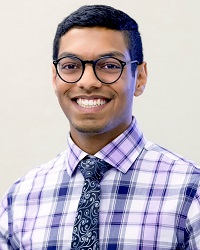 NSU alumnus Aadil Vora (2014, B.S. in Biology, Honors and Dual Admission student) is a first-year medical student in the university’s D.O. program. Although most of his time is devoted to becoming a physician, Vora also enjoys the visual and performing arts. At the London Academy of Music and Dramatic Arts, he earned bronze and gold medals for his work in monologues (2011) and musical theatre (2012). Vora cites theatre as a major influence in his decision to study medicine. Acting taught him how to see the world through the eyes of a given character, and he now uses those skills to view clinical experiences through the eyes of his patients. In 2012, Vora coached elementary school students in a creativity competition called Odyssey of the Mind. After studying how children think critically and creatively, he presented his findings. Intrigued by the sources and outcomes of creativity in children, Vora is looking forward to his future pediatrics and psychiatry clinical rotations.
NSU alumnus Aadil Vora (2014, B.S. in Biology, Honors and Dual Admission student) is a first-year medical student in the university’s D.O. program. Although most of his time is devoted to becoming a physician, Vora also enjoys the visual and performing arts. At the London Academy of Music and Dramatic Arts, he earned bronze and gold medals for his work in monologues (2011) and musical theatre (2012). Vora cites theatre as a major influence in his decision to study medicine. Acting taught him how to see the world through the eyes of a given character, and he now uses those skills to view clinical experiences through the eyes of his patients. In 2012, Vora coached elementary school students in a creativity competition called Odyssey of the Mind. After studying how children think critically and creatively, he presented his findings. Intrigued by the sources and outcomes of creativity in children, Vora is looking forward to his future pediatrics and psychiatry clinical rotations.
“Trick Your Mind into Being Creative”
Why is facing a blank canvas so difficult? Is it the blinding glare of the paper that makes your eyes squint, or is it the perplexity of countless possibilities? Time and time again, when facing problems that require our creative best, we simply don’t know where to start and, instead, get stuck with obvious and boring ideas. Inventing the ingenious can seem insoluble! But there is a simple mindhack anyone can use to get over this “writers block,” spark the mind, and ignite the creative process. In this talk, Aadil Vora will demonstrate how we can trick ourselves into thinking more creatively while filtering out the cliché.
Kathleen Waites
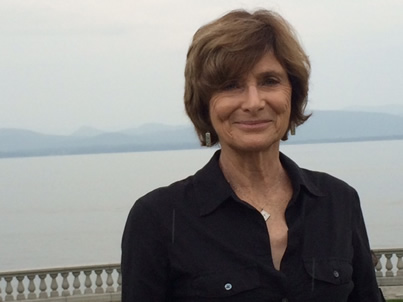 Kate Waites, Ph.D., is a professor at NSU’s College of Arts, Humanities and Social Sciences, where her teaching focuses on English and gender studies. A benefactor of the gains won by feminism as a young woman, she proudly embraces the label of “feminist.” Waites has made it the subject of inquiry in her scholarly writing on popular culture and on women’s texts, and its themes and concerns have found their way into her gender studies classes, including the Honors seminar called The “F” Word: Feminism and Culture. The social revolutions of the 1960s–70s—feminism, the Civil Rights Movement, the Gay Rights Movement—reshaped a nation to be closer to the American ideal of equality. Waites’ memoir, Particular Friendships: A Convent Memoir, is set in mid-20th century America and explores the journey of a young woman’s self-identity against the backdrop of second-wave feminism—a story that resonates in the new millennium.
Kate Waites, Ph.D., is a professor at NSU’s College of Arts, Humanities and Social Sciences, where her teaching focuses on English and gender studies. A benefactor of the gains won by feminism as a young woman, she proudly embraces the label of “feminist.” Waites has made it the subject of inquiry in her scholarly writing on popular culture and on women’s texts, and its themes and concerns have found their way into her gender studies classes, including the Honors seminar called The “F” Word: Feminism and Culture. The social revolutions of the 1960s–70s—feminism, the Civil Rights Movement, the Gay Rights Movement—reshaped a nation to be closer to the American ideal of equality. Waites’ memoir, Particular Friendships: A Convent Memoir, is set in mid-20th century America and explores the journey of a young woman’s self-identity against the backdrop of second-wave feminism—a story that resonates in the new millennium.
“An ‘F’ Word Revival in the New Millennium”
Declared dead on Time magazine’s June 1998 cover, feminism has been standing on wobbly legs since the 1980s, thanks to public misperception and media-spin. In 1968, a Miss America Beauty Pageant protest in Atlantic City dubbed feminists as radicals and gave feminism a longstanding black eye. However, today’s social-justice-oriented and media-savvy generation, led by millennial celebrities—including Emma Watson, Lena Dunham, and Beyonce—is creating a more feminism-positive environment. If second-wave feminism rode the coattails of the Civil Rights and Peace movements, today’s surprising feminist revival may well be riding the wave of the gay rights and same-sex marriage movement. Feminism remains a controversial term, inspiring vitriol as well as celebration. But millennials, having outed the media-produced bogeyman, recognize that women’s rights are human rights, that men have a place in the movement, and that there is still much collective work to be done to realize the goal of sex and gender equality.
Matthew Ware
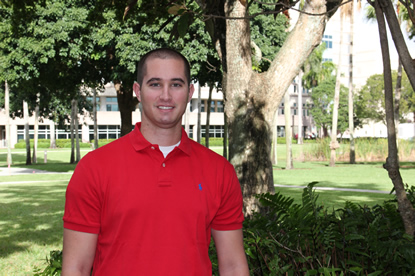
“Sharks Like Bubbles Too”
Man’s misunderstanding of the marine realm has spawned fascinating tales of heroes, sea monsters, adventures, and misery beyond imagination. Sea creatures have terrified and captivated generations the world over—probably none more so than sharks. Their powerful jaws, rows of unending razor-sharp teeth, and immense muscular bodies endow them with incredible speed and strength—all perfectly designed by millennia of “hunt or be hunted” survival skills. Our perception of sharks as terrifying eating machines is among the most persistent stigmas of nature. Our fear of these beautiful creatures has spawned awful legislation and heinous fishing practices. Thankfully, we are beginning to understand their true ecological value as top predators of the seas. Their economic force is also growing, as armies of tourists descend on aquariums, while SCUBA training allows individuals to witness sharks firsthand in their natural environment. These are powerful tools to combat the misunderstanding of sharks and help us remember that we are visitors in their world.